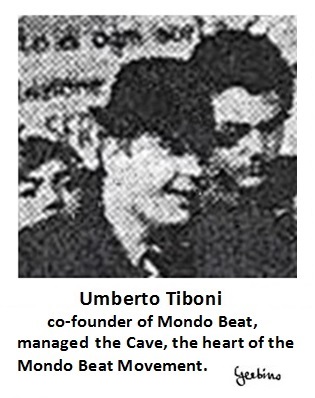
Umberto Tiboni, the management of the Cave, the hearth of the Mondo Beat Movement.
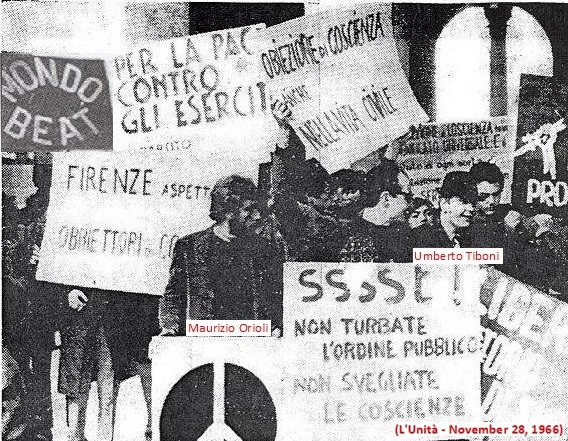
Umberto Tiboni at the Handcuff Demonstration.
Introduction to "Mondo Beat N. 2".
During the two weeks in which Mondo Beat confronted the establishment, many visitors came to the Cave. Among them there were Catholic priests who contestated the Vatican to assert their right to marry, there were gay and lesbian activists, conscientious objectors to compulsory military service, environmentalists, macrobiotic dietitians, activists against animal vivisection... they joined the Mondo Beat Movement spontaneously and their participation would have contributed to making the Cave the crucible of the renewal of Italian society.
In addition, some young militants from political parties, both from the right and from the left, came to the Cave to show their sympathy for the Beats, as they admired their courage to openly confront tyranny. This trend would have increased over time and many young people would leave political parties and join the Mondo Beat Movement.
In those same days, other young people, who had not had any relationship with the Beats, began to frequent the Cave. These youths would easily understand that they did not have to comply with a specific program, but their way of participating in the Movement would have become part of its reality. They were discreet and generous youths, fortunately they were numerous and among them was Giò Tavaglione, a genial artist who would become the designer of Mondo Beat.
But, unfortunately, other kind of people would also arrive at the Cave, people who wanted to achieve literary success by publishing their writings in Mondo Beat magazine, while, on the other hand, they avoided the risks of participating in the demonstrations of the Movement. In addition to being cowards, these persons were confused, as they did not understand what was going on with the Contestation. They wrote nonsense and were intrusive, some of them would have taken Melchiorre Gerbino's breath away, for the pressure they made to have their writings published. Melchiorre Gerbino could not ask them to get away from the Cave, as he had not this authority, Mondo Beat having been conceived so that no one had authority over others, only people who would not comply with the obligations of no violence, no drugs, no theft, could be expelled from Mondo Beat structures (and no one ever was).
Not having found any other way to get rid of these characters, Melchiorre Gerbino would have published some of their writings, but on strict condition that they did not attend the Cave, thus avoiding that they could annoy the youths of the Base with their blah blah. These insufferable characters were defined as external contributors to Mondo Beat magazine. Melchiorre Gerbino did not read their writings at the time of publication, having understood at a glance they were nonsense

Nor has Melchiorre Gerbino had the patience to read these writings so far, so he will not comment on them.
Mondo Beat N. 2 (Issue 4)
- March 15, 1967 - Edition: 7,000 copies.
Note. With the exception of one cliché on the cover, that of a priest with his hand on his hat, which was drawn by Giò Tavaglione at the request of Melchiorre Gerbino, all the other clichés with which Melchiorre Gerbino structured this issue were kindly provided to Mondo Beat by L'Unità, the official newspaper of the Italian Communist Party. These clichés had already been printed by L'Unità and were piled in bulk in a box, from which Gerbino could take at will thanks to Giorgio Manzini, a journalist from L'Unità who had previously interviewed him. As we will see, the magazine Mondo Beat will always maintain a well-defined distance from communist (as well as fascist) political positions but L'Unità would always have had the fair play to allow Gerbino to take from the old clichés as he pleased.
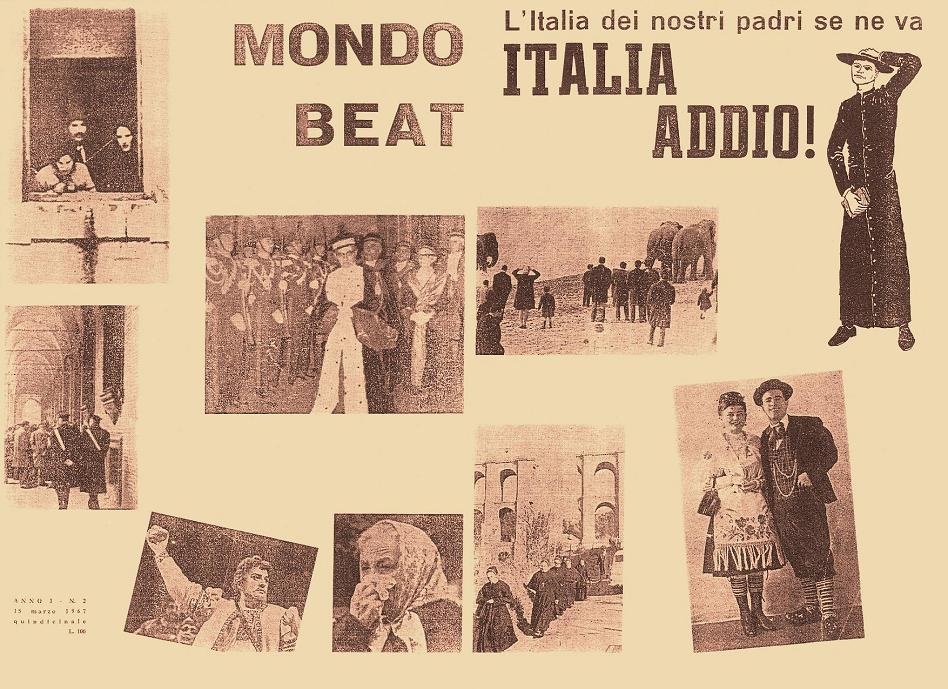
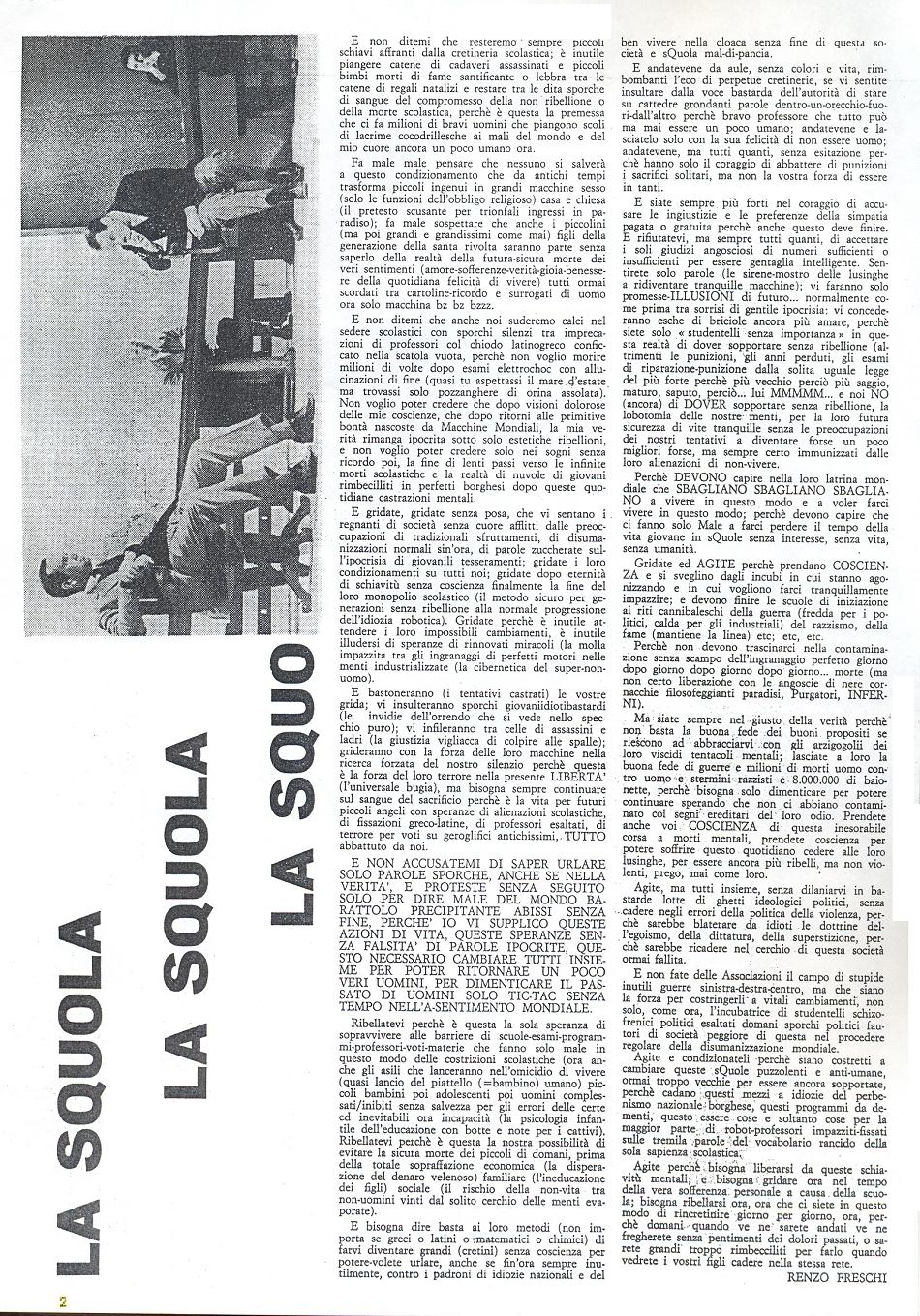
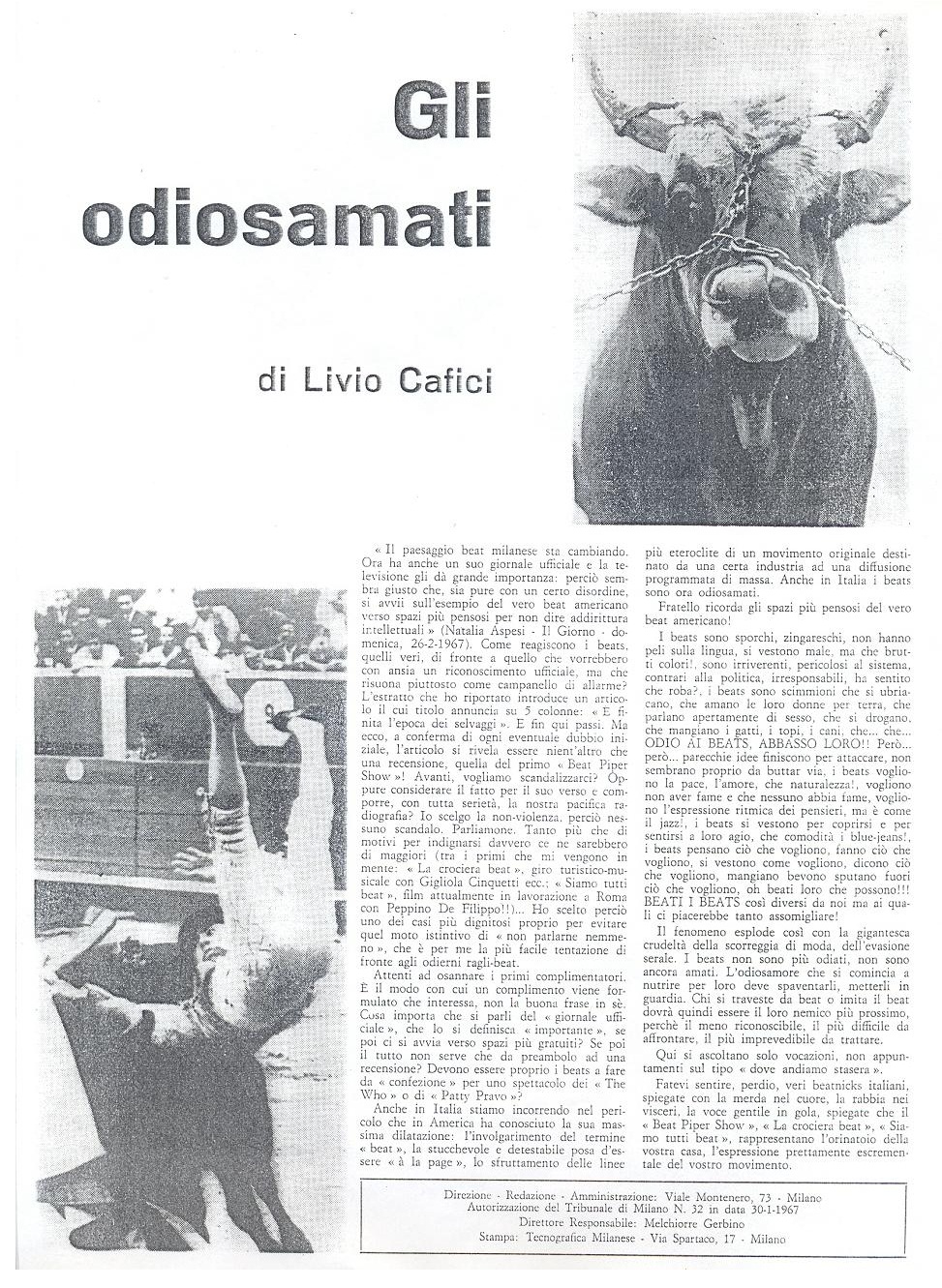
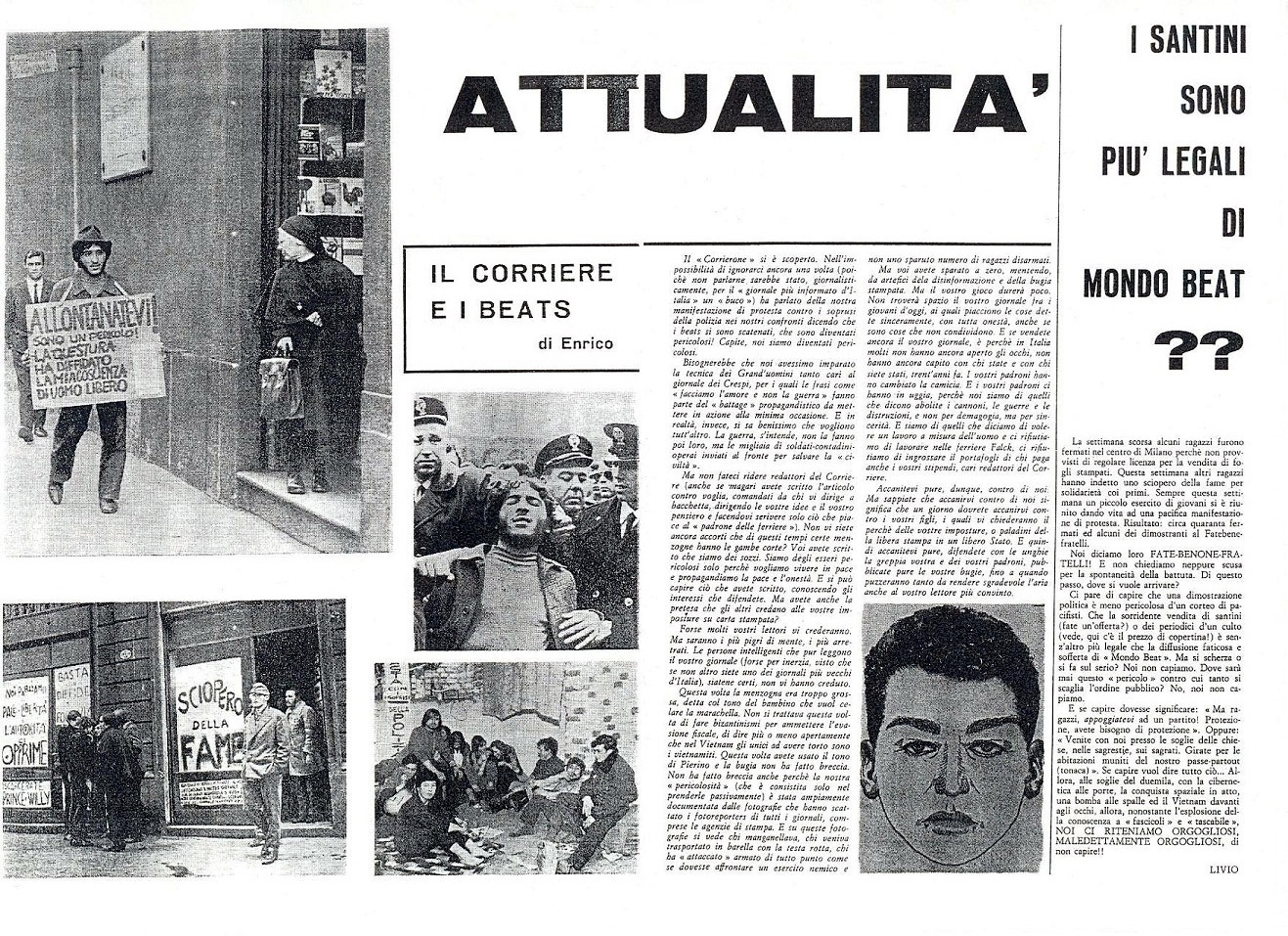
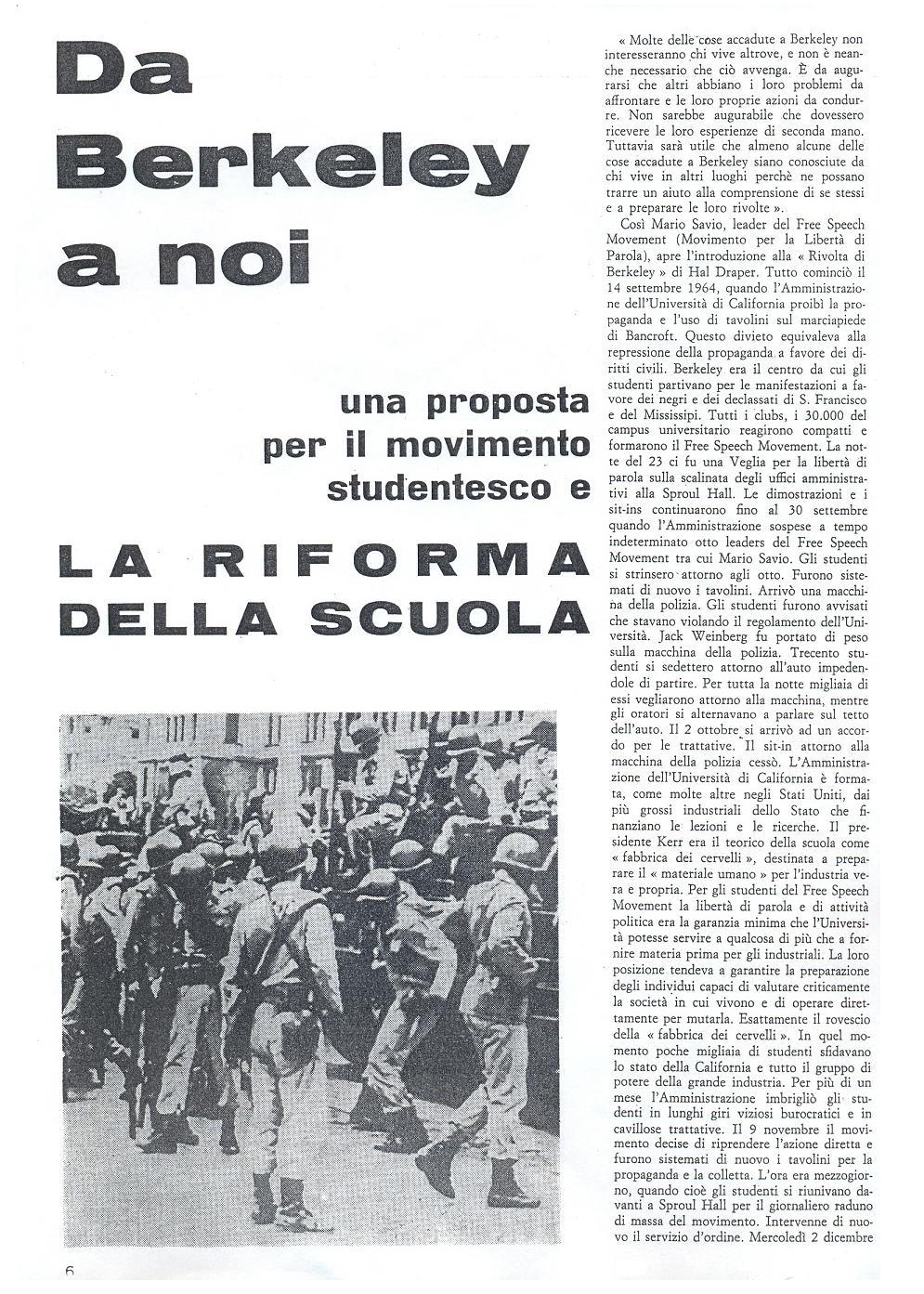
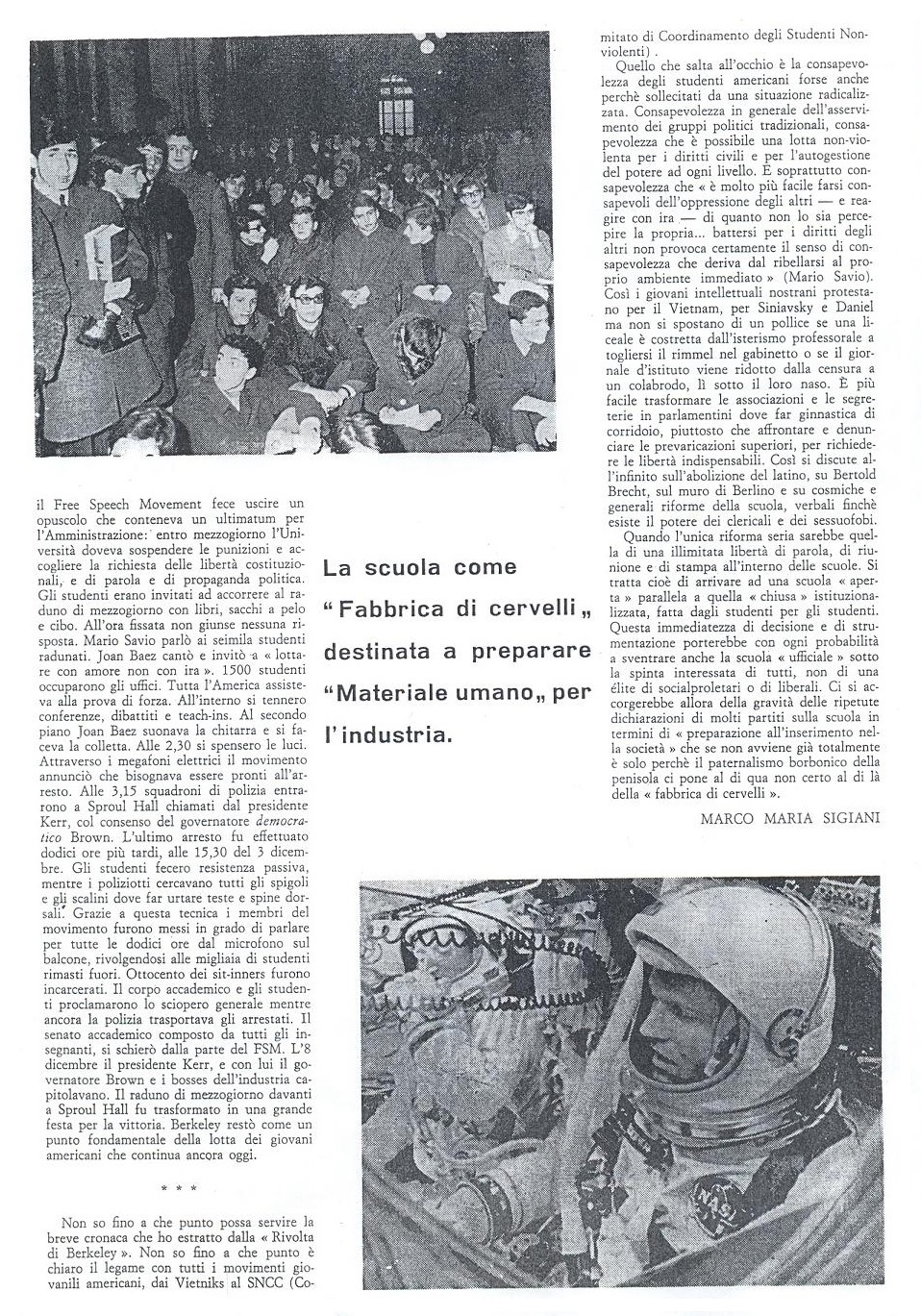
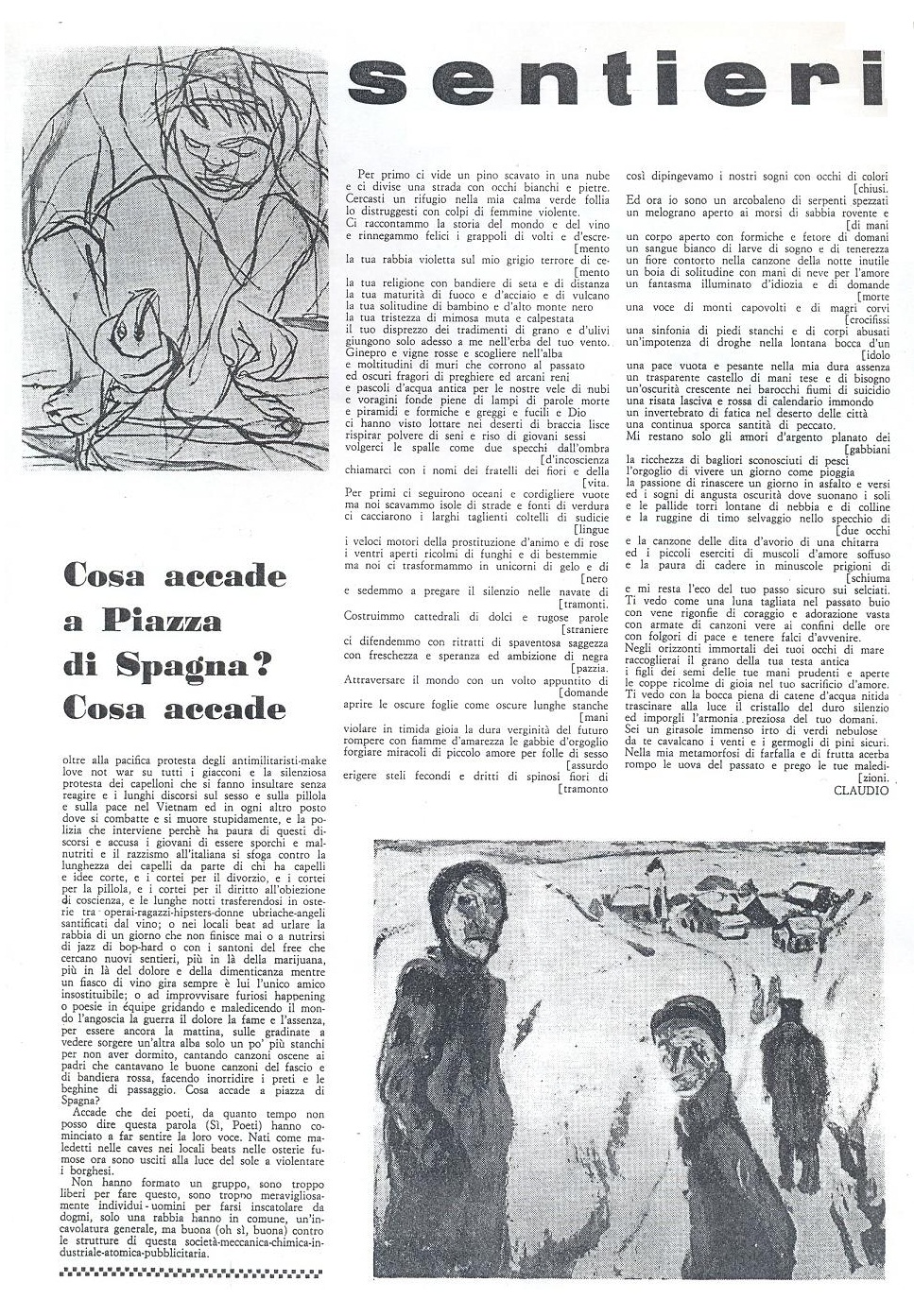
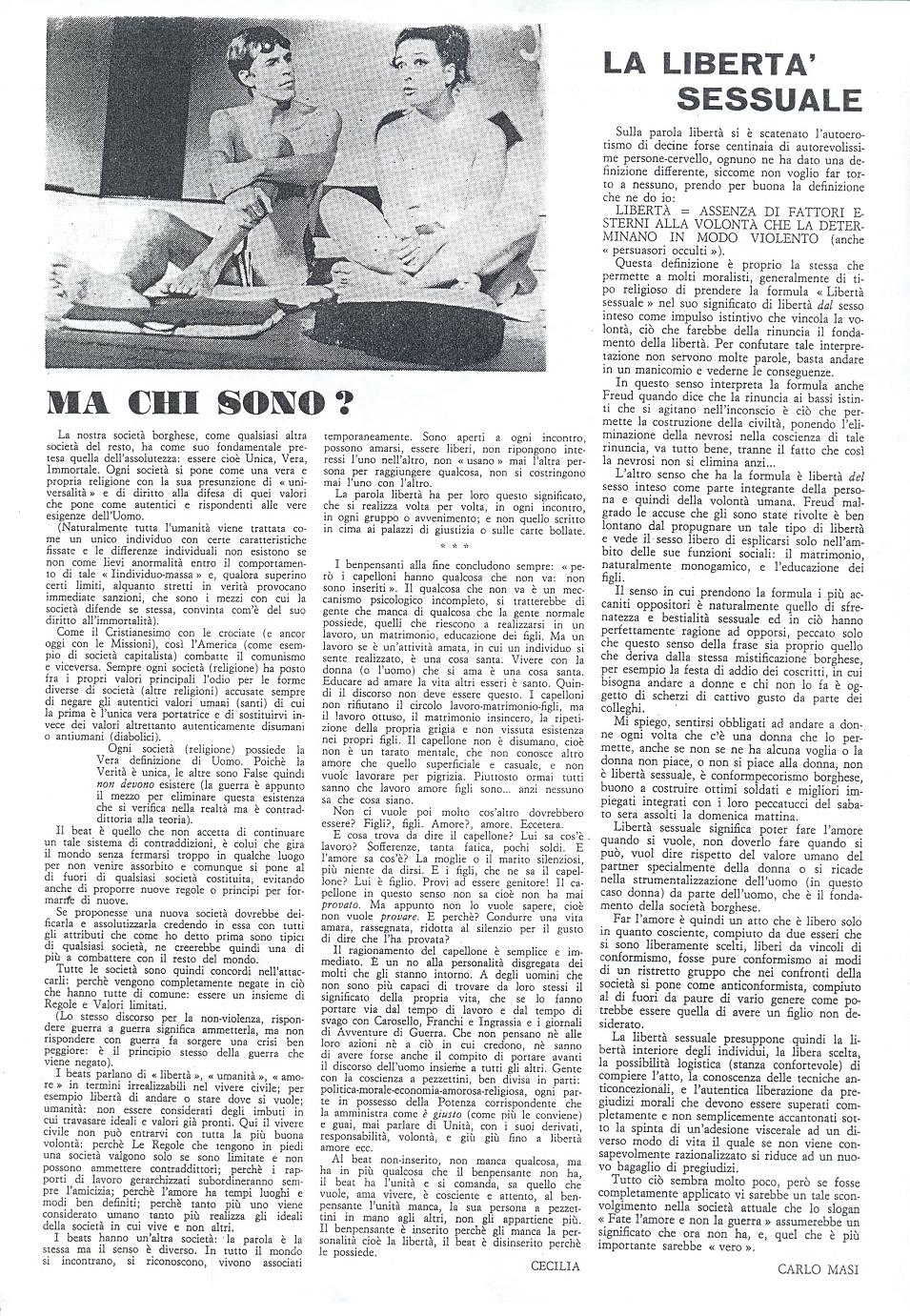
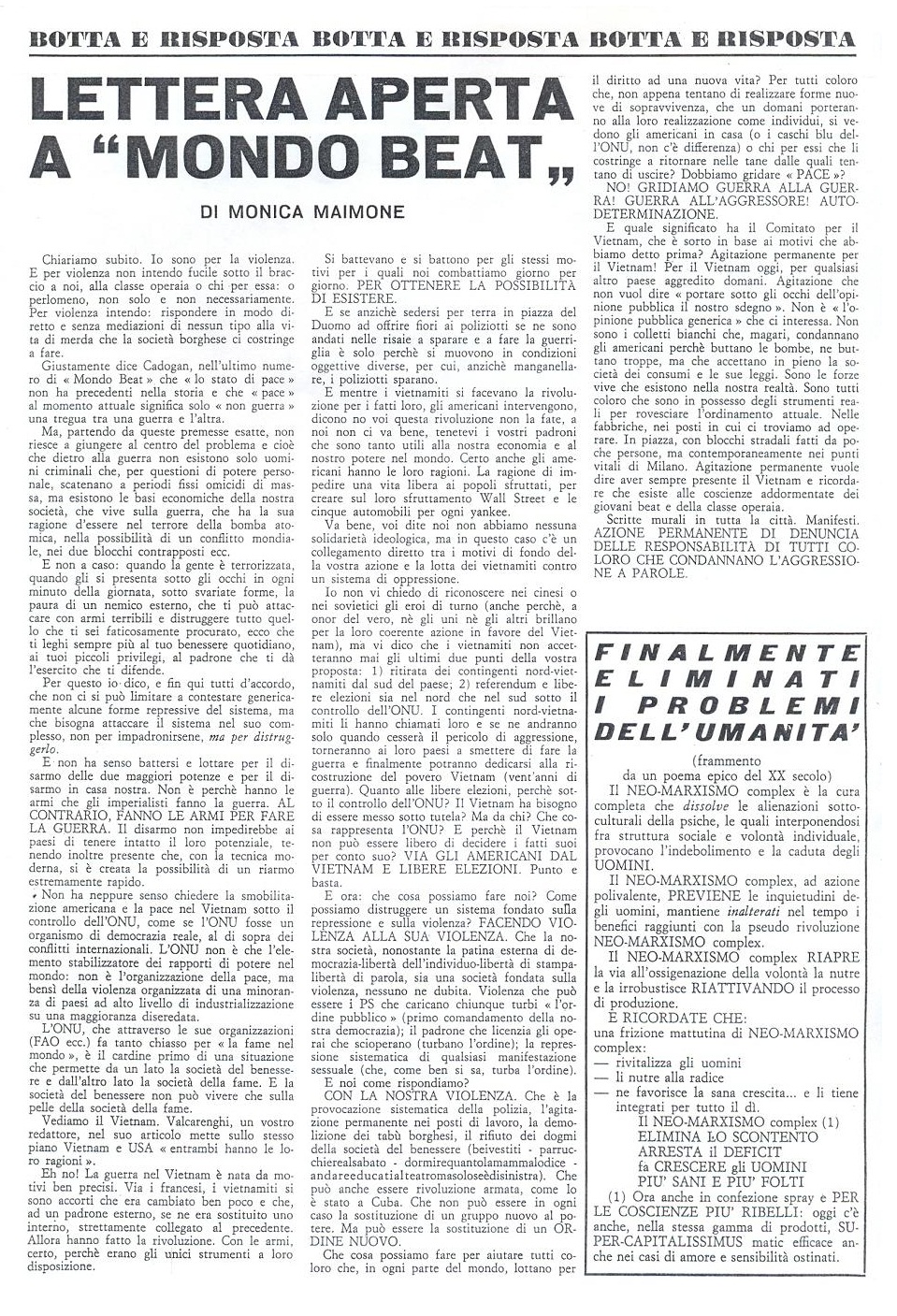
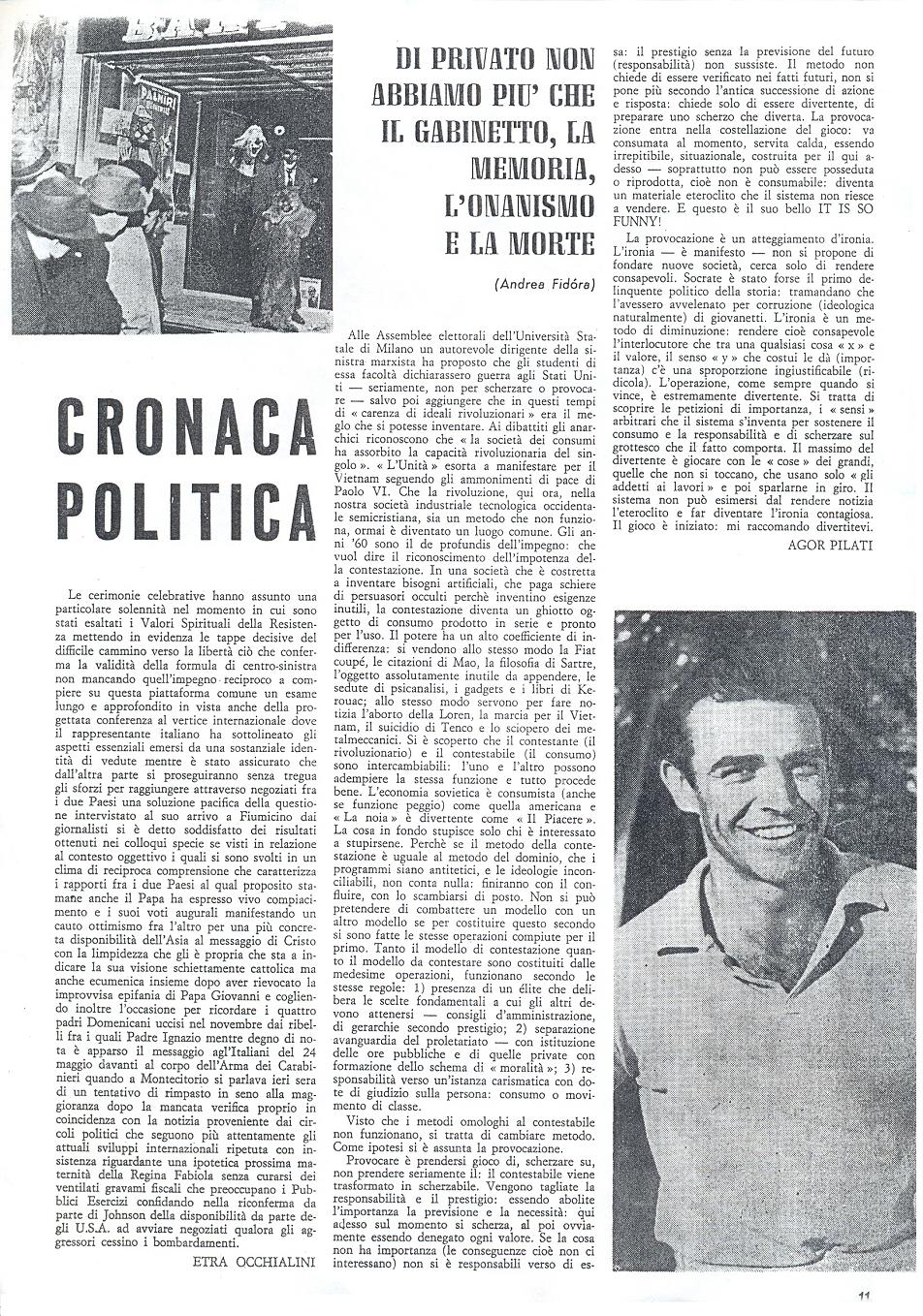
Comments on articles.
pages 1 and 12
With this collage Melchiorre Gerbino contestated the anachronistic Italian Establishment. On the cover reads "L’Italia dei nostri padri se ne va. ITALIA ADDIO!" (The Italy of our parents is leaving. FAREWELL, ITALY!). The saying "Italia addio!" was inspired by "Africa Addio" (Farewell Africa), an Italian documentary, world famous, which showed events which occurred in Black Africa after the end of the colonial era.
page 2
"LA SQUOLA" by Renzo Freschi. Here is the second part of an article whose first part was published in the previous issue and gave the prosecutor Antonio Scopelliti a pretext to order the seizure of that issue and to indict Renzo Freschi and Melchiorre Gerbino for offending public decency.
Of the many writings published by Renzo Freschi in the magazine Mondo Beat, this one on the Italian school system is the only truly appreciable one and the deliberately incorrect term "squola" (instead of the correct "scuola") is now in use to joke on the Italian school system.
page 3
On this page you will find the first article published by an external contributor to Mondo Beat magazine, titled "Gli odiosamati" (The loved-hated ones)"

Melchiorre Gerbino still remembers this external contributor because when he showed signs of annoyance, due to this external contributor's insistence on wanting to publish this article, then this external contributor, to stimulate compassion, told of his German mother who had killed the wolfdog with an injection, as the beast was aging and was shedding in the apartment.
pages 4 and 5
In this double page there are photos of some events of the Mondo Beat Movement, and there is the article "IL CORRIERE E I BEATS" (The Corriere and the Beats) by Enrico. As already mentioned, Enrico was a journalist in the Corriere della Sera, who wrote anonymously against his newspaper from the pages of Mondo Beat magazine. In this article Enrico criticizes the unfair press campaign conducted by Corriere della Sera against Mondo Beat.
-------
On the same double page, in the last column on the right, there is an article, titled "I SANTINI" (The images of the saints), written by the same external contributor

whose mother killed the wolfdog (Look how moved Gerbino was, who published two articles by this external contributor in the same issue!).
page 6
"Da Berkeley a noi. Una proposta per il Movimento Studentesco e LA RIFORMA DELLA SCUOLA" (From Berkeley to us. A proposal for the Student Movement and SCHOOL REFORM) by Marco Maria Sigiani.
With this article Marco Maria Sigiani made a valuable contribution to this issue, for the information he provided on the events that occurred at the University of California at Berkeley Campus.
Marco Maria Sigiani blew the true wind of counter-information by recounting the student protests in the United States, while focusing on the school situation in Italy.
page 7
"Da Berkeley a noi. La scuola come Fabbrica di cervelli, destinata a preparare Materiale umano per l'industria" (From Berkeley to us. The school as a brain factory, programmed to prepare human material for industry) by Marco Maria Sigiani.
Marco Maria Sigiani was certainly one of the most informed and original collaborators of Mondo Beat magazine.
page 8
 -
- 
Writings by two external contributors to Mondo Beat magazine, titled respectively "Cosa accade in Piazza di Spagna?" (What happens in Piazza di Spagna?) and "Sentieri" (Paths).
page 9
"MA CHI SONO?" (But who are they?) by Cecilia on the Beats.
-------
On the same page, "LA LIBERTÀ SESSUALE" (Sexual freedom) by Carlo Masi.
Carlo Masi was one of the first university students to join the Mondo Beat Movement. At that time he was attending college, then he would obtain a degree in psychoanalysis. Carlo Masi was a close friend of Vittorio Di Russo and Melchiorre Gerbino.
page 10
"LETTERA APERTA A MONDO BEAT" (Open letter to Mondo Beat) by Monica Maimone.
She was a young communist activist who criticized Mondo Beat for the methods and practices with which it confronted the power, since in her opinion they were not efficient, and she praised the methods and practices of Communism.
Marco Maria Sigiani replied to Monica Maimone. It is interesting to read some excerpts of his reply, to have an idea of the distance the Mondo Beat Movement had from the communists:
"FINALMENTE ELIMINATI I PROBLEMI DELL'UMANITÀ "(Finally, humanity's problems are eliminated).
New Marxism Complex opens the oxygenation channels of the will, nourishes, strengthens and reactivates the production process.
In the morning a massage from the New Marxism Complex
revitalizes men
feeds them to the root
promotes their healthy growth and keeps them integrated throughout the day.
New Marxism Complex
eliminates discontent
stops the deficit
makes men grow healthier and denser...
page 11
"CRONACA POLITICA " (Political chronicle) by Etra Occhialini.
It was an ironic political chronicle, which gave rise to a strand of political satire of the same style, both in literature and in theatre.
-------
On the same page, "DI PRIVATO NON ABBIAMO PIÙ CHE IL GABINETTO, LA MEMORIA, L'ONANISMO E LA MORTE" (We no longer have anything private, except toilet, memory, masturbation and death) by Agor Pilati (Antonio Pilati), who quoted this sentence by Andrea Fidóra to give title to his article.
With this article Antonio Pilati intended to pay homage to the models of "provocation", according to the approach of the Dutch Provos. But it must be considered that this article was conceived after the terminology of the Contestation had already been formulated and the Contestation had had its baptism of fire with the Demonstration of Contestation of the Establishment. But Antonio Pilati was not aware of what had happened. A high school student who was preparing to take the exam, he had had no time to participate in the events of the Mondo Beat Movement and while the Contestation opened new scenarios in Milan, Antonio Pilati still praised the models of the "provocation", when they were obsolete and nothing happened anymore in Amsterdam.
Antonio Pilati had been so nailed to a chair and a table that he had not been able to reach the window of his room to observe History proceeding beneath it.















 -
- 